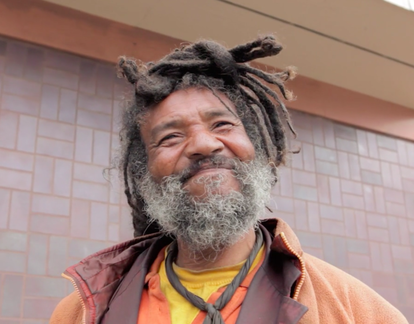 Thomas Myron Hooker, who died on October 27, 2016, and lies in the pauper's section of Holy Cross Cemetery, Colma A still of Thomas Hooker from the documentary "Voices." (Photo: Voices/Vimeo)
Thomas Myron Hooker, who died on October 27, 2016, and lies in the pauper's section of Holy Cross Cemetery, Colma A still of Thomas Hooker from the documentary "Voices." (Photo: Voices/Vimeo) Our Lord tells the parable of the Good Samaritan in response to a lawyer’s question: “what must I do to have eternal life?” Christ replies with a question: what does God command? The lawyer answers “Love God. Love your neighbor.” Our Lord nods in approval. Do this, and you will live. But as lawyers are wont to do, he has another question: “And who is my neighbor?” Jesus answers with the parable of the Good Samaritan, which dramatically shows who is my neighbor, and how to love him. Answer: Everyone is my neighbor, and I love him by meeting his basic needs with my time and money. As Mother Teresa said, “you must touch the poor; you must give until it hurts” (until you feel it). The lawyer got it right: love God and love neighbor. But it is in the doing that we often fail. Twice Our Lord tells the lawyer to “do”: “do this and you will live;” “go and do likewise.”
Loving God first, and then our neighbor for the love of God, is more than just a feeling. Is anyone not moved to compassion by images of a wounded and dying person? The news media, and the entertainment industry (which are hardly distinguishable these days), monetize our compassion. We want to know if people are suffering in Syria, or in Eritrea, or in Odessa, Texas. We want to see the suffering and feel the compassion, because compassion is a naturally good feeling. But do we do anything about it? “Which of the three was neighbor to him?” Jesus asks the Pharisee, who replies, “the one who showed him mercy”—the one who gets dirty, bloody, and sweaty to help a poor man who is dirty, bloody, and sweaty. St. Augustine says that the Samaritan represents Our Lord, and the dying traveler represents Adam. God felt compassion, as we all do, but further, he acted on that compassion. He came down from heaven and bled for us on the cross.
Myron of the stinking rags and beatific smile
Some of you may remember a homeless man who would come to our parish named Myron. He lived in a tent on 12th Avenue, and Jean and Arnold Low brought him breakfast every day for 22 years. That’s compassion! On the morning of October 27th, 2016, they brought Myron’s breakfast, but no sound came from the tent. They went to Mass and came back to find the food untouched, and his stiff body inside the tent. Myron used to attend our Masses covered in filthy dreadlocks and stinking rags. He kept to the back of the church and no one wanted to be near him for very long because of his smell. But Myron beamed the most radiant smile, and people would put up with his odor just to receive that smile. His name in Greek, Myron, means sweet oil, as in “myrrh.” “That’s what my mother named me,” he would say with a smile.
The Hebrew word for Myron is Mashiach, which was translated Christus in Greek. The Messiah Jesus Christ is the Anointed One, bearing the fragrance of healing oil to the world. Our Myron was definitely not sweet smelling, and yet his sweet smile healed us all. 700 people came to his funeral. He was certainly an outcast, one of the city’s many street people, psychologically imbalanced, thrown away and forgotten. Among the many truths contained in the parable of the Good Samaritan is that the poor anoint us. God saves us from self-absorption through his beloved poor, if we take the time to see them, to talk with them, to “touch” them. St. Vincent de Paul said that “those who love the poor in life not be sad in this life and will have nothing to fear in death.”
The poor enrich us
Of course, serving God in the poor is work. The Good Samaritan had to change his travel plans to help the beaten man. He got blood and sweat smeared on him, and perhaps even other bodily execrations, by hauling the helpless broken body of this man onto his own donkey. But there is a kind of blessing, a grace and a joy, that comes only by surrendering to a poor man’s need. God gives us the poor to slow us down, to smell the sweet scent of His presence along the road. We can’t help every broken person, but if we never stop to help another man, we remain the poorest of men.
The poor closest to us, however, are those we live and work with. There is a person in your house, or with whom you work, who annoys you. You avoid him or her, which is in many cases not unreasonable. But there are times when you should not avoid an annoying person. God wants to bless you through that person, but you need to surrender a bit of your time and attention. Smile at annoying people every time, and give them your patient attention from time to time. Mother of Jesus, help us to be patient and attentive to those who need a smile and perhaps a helping hand.


 RSS Feed
RSS Feed